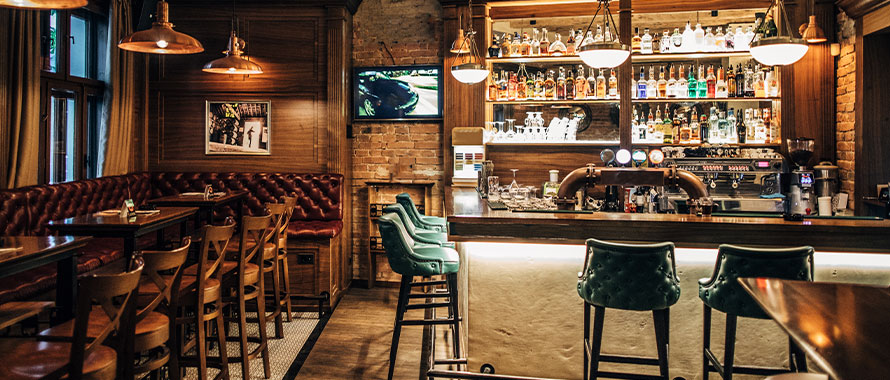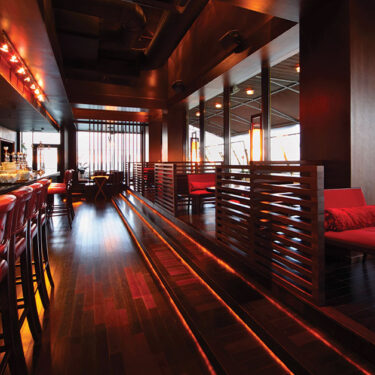The hospitality industry is facing challenges due to a tightening insurance market, which is a result of increasing claim costs and the withdrawal of many admitted carriers. To gain insights into how Excess & Surplus (E&S) insurance is responding to these issues, we spoke with Aaron Pfister, Associate Managing Director and Underwriter at Burns & Wilcox in Scottsdale, Arizona.
Why is the Hospitality sector increasingly shifting to E&S for Commercial Casualty insurance?
A.P.: Many admitted insurers are withdrawing from the Hospitality sector, leaving bars, restaurants, and other businesses with fewer options in the standard market. As a result, these businesses are increasingly turning to E&S markets for Commercial Casualty insurance. This shift is driven by several key factors, including:
- State-specific regulations: Each state has unique insurance requirements and risk profiles. For instance, “dram shop laws,” which determine when establishments that serve alcohol can be held liable for harm caused by intoxicated patrons, vary widely across the U.S. Additionally, some states, like Arizona, that were once considered accommodating to hospitality risks have become stricter, while others, such as California, may offer more favorable conditions than expected.
- Rising claim costs: The frequency and severity of claims, particularly in areas like Liquor Liability and Assault & Battery, continue to rise. The large payouts associated with these claims make it increasingly challenging for standard insurers to provide coverage.
- Increased coverage complexity: Hospitality businesses often face specialized risks that necessitate separate policies for General Liability (GL), Property, and Liquor Liability, adding layers of complexity to obtaining adequate coverage.
- Higher underwriting scrutiny: New ventures and those with a high percentage of alcohol sales encounter heightened underwriting requirements, further limiting their options in traditional markets.
These challenges highlight the growing importance of E&S markets, which are better equipped to provide flexible and tailored solutions for the unique risks faced by the hospitality industry.
What are some common misconceptions or overlooked coverages in this sector?
A.P.: One prevalent misconception among newer brokers is that Liquor Liability is automatically included in GL coverage. However, GL and Liquor Liability are distinct coverage forms, so it is crucial to ensure that both are secured for establishments that serve alcohol.
Additionally, some may assume that GL and/or Liquor Liability policies cover all potential liability exposures, but that is not necessarily the case. For example, carriers are increasingly excluding Assault and Battery (A&B) coverage or providing low sublimits for it due to current market conditions. This can become a significant coverage issue if a claim arises from a fight or incident occurring at a bar, restaurant, or other venue.
Another frequently overlooked aspect is a business’s social media and online presence. Insurance carriers are increasingly scrutinizing how businesses advertise themselves to ensure their public promotions align with their insurance applications to avoid discrepancies that could jeopardize their coverage.
Can you provide some examples that illustrate the risks or coverage gaps you just described?
A.P.: Certainly. Consider these two scenarios:
A bar launches a new promotion featuring all-day drink specials and live entertainment every Tuesday. The promotion gains traction quickly, with significant advertising on social media platforms like Instagram and Facebook.
One night, during the promotion, a patron becomes intoxicated, stumbles while leaving the bar, and sustains a severe injury. A lawsuit follows, alleging negligence on the part of the bar for overserving alcohol. Upon investigation, the insurer determined that this recurring promotion was not disclosed in the insurance application, nor was the bar’s marketing strategy for such events. The insurer argues that the promotion represents a risk not underwritten and denies the claim.
Additionally, the insurer cancels the policy mid-term, citing a breach of policy terms related to business operations. The bar is left without coverage for the claim and struggles to secure a new policy due to the uncovered incident and perceived higher risk.
In another case, a restaurant is applying for insurance coverage. During the quoting process, it is discovered through the restaurant’s social media accounts that they are offering THC-infused drinks—something the retail agency was unaware of. This creates significant eligibility issues, as many policies exclude coverage for cannabis-related products.
If a claim arises from a customer’s adverse reaction to the THC-infused drinks, the claim would likely be denied due to the policy exclusion. Moreover, the oversight in thoroughly vetting the insured’s social media activity not only delays the quoting process but could leave the client without adequate coverage for an emerging exposure.
What advice can you offer brokers and agents working with hospitality clients?
A.P.: Maintaining proactive and open communication with your clients is key. For newer ventures, quarterly check-ins can help ensure that their coverage aligns with any operational changes. During these discussions, ask questions such as:
- Are there new promotions or specials being introduced?
- Has the client started catering to a different demographic, such as college students or families?
- Are there plans for special events or new features, such as live entertainment, table-side cooking, or mechanical bulls?
These conversations can uncover risks that might otherwise be overlooked, ensuring that the policy accurately reflects the business’s operations. Additionally, emphasize the importance of proper staff training, especially for employees serving alcohol. Many carriers require staff members to have up-to-date certifications in responsible service practices. This can mitigate risks and make clients more appealing to underwriters.
What should brokers and agents prioritize when working in this space?
A.P.: Hospitality risks require a high degree of attention to detail. Beyond securing coverage, brokers should act as risk advisors, helping clients understand how their decisions—such as a new promotional campaign or a large event—can impact their insurance. In some cases, clients may need a separate special event policy for activities outside of their usual operations.
By fostering strong relationships with both the insured and wholesale partners, brokers can stay ahead of potential issues and provide comprehensive coverage solutions. The goal is not just to secure coverage but to ensure clients are well-positioned to manage their risks and remain insured, especially in a challenging market.
WHY YOUR CLIENTS MIGHT NEED IT: The Hospitality sector encounters unique and increasing risks, such as Liquor Liability claims and stricter underwriting for businesses with significant alcohol sales or new ventures.
PROTECTS AGAINST: Financial and legal liabilities associated with Liquor Liability, Assault & Battery, and evolving state-specific regulations.
EXPERT OPINION: “E&S markets excel at providing creative solutions for the hospitality sector. They offer specialized coverage that addresses complex risks, including Liquor Liability, Assault & Battery, and changing state regulations. This flexibility makes them an invaluable option, especially as admitted carriers continue to retreat from this space.”







